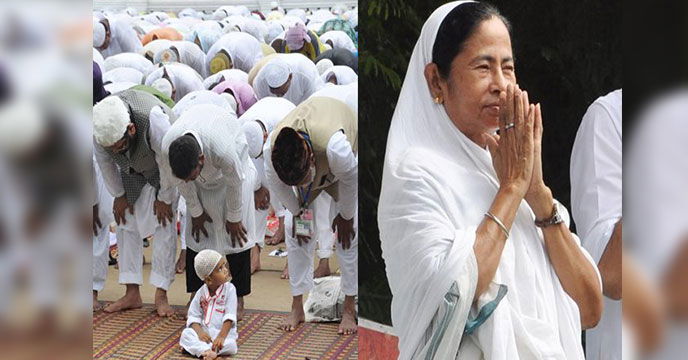the future of Hindus of West-Bengal lies in their hand: elections 2021


Crossing the border illegally, violently displacing the local population, attacking the young, the elderly, and especially the girls and women, kidnap, forcibly convert, or traffic into brothels – these aren’t the acts of the illegal immigrants to Europe or North America. These are the atrocities credited to the Muslims penetrating India’s West Bengal region from Bangladesh.
These Bangladeshi immigrants are becoming culpable for criminal activities like arms and drug smuggling and even sexual slavery. The western media have been turning a blind eye to it in its pursuit of evading the label of being “politically incorrect” or “Islamaphobic.”
Phyllis Chesler in his piece for fox news recalls the silence of the media when Islamic zealots ransacked the office of the Kolkata-based newspaper, The Statesman. The attack, as reported, was in retaliation for an article that condemned Islamic extremism. The state showed no restrain as both the editor and the publisher were arrested for offending “Muslim sentiments” while the rioters were let free.
The state that is currently is being governed by the Trinamool Congress under the leadership of Mamata Banerjee has been heavily criticized for its “extreme Muslim appeasement” politics. West Bengal under Banerjee has witnessed riots repeatedly and has severely affected the communal harmony in the state. West Bengal is home to 27 percent of the Muslim population, the second-highest after Assam.
Demographic changes in West Bengal have been going on for years under the watch of various governments. Illegal migration and settlement of Bangladeshi Muslims in search of a new life into West Bengal have been taking place for decades.
During the partition, the Muslim population of West Bengal was placed at 12%, and the Hindu population of East Bengal (Now Bangladesh) at 30%. Today, with massive Muslim infiltration and Hindu persecution, West Bengal’s Muslim population has soared up to 27% as per the 2011 census conducted by the Government of India while Bangladesh’s Hindu population saw a decline to 8%.
With the situation of Hindus in Bangladesh deteriorating, life has become painstakingly difficult for the community in West Bengal under a Muslim-appeasing government.
Tapan Gosh, one of the very few brave Hindus who are taking a stand against the persecution, spoke to Phyllis Chesler about the anti-Hindu sentiment in his homeland. In 2008, Ghosh founded “Hindu Samhati” that stands in solidarity with the persecuted Hindu communities in both West Bengal and Bangladesh.
In his interview with Chesler, Ghosh emphasized the fact that the Muslim persecution of Hindus in India is nothing new. A sentiment that spans over a period of 800 years, thousands of Hindus were massacred by Muslims.
In 1946-1947, during partition, Muslims slaughtered thousands of Hindus in Calcutta that is regretfully remembered as the Bengal riots of 1947. Anti-Hindu riots and massacres continued even in the 1950s and 1960s, but in 1971, when East Pakistan liberated itself to form Bangladesh, things worsened for Hindus.
As Ghosh explained to Chesler in the interview, the liberation movement for Bangladesh was built upon by the escalation of atrocities against the Hindus. In March 1971, the Pakistan government and its supporters in East Pakistan launched an operation named “Operation Searchlight” to crush all pro-liberation activities along the border.
In his analysis, Chelser stated that there has recently been a sharp increase in incidents of Muslims rioting during Hindu festivals and atrocities of other kinds including thousands of Hindu girls being kidnapped and trafficked into sexual slavery.
On 29th January 2015, a small dispute in a Hindu shop in the Usthi district led to thousands of Muslims attacking all the Hindu shops in the market. Over fifty Hindu shops looted and ransacked as the state minister (Giasuddin Molla) belonging to the Trinamool Congress stopped police from taking action.
Similarly, in December 2016, in Dhulagarh in Howrah district, Muslim mobs allegedly attacked and looted shops and houses of the local Hindus trying to set them on fire. Reportedly an altercation on 12 December 2016 between the communities indulging in religious rituals provoked the attack. These are some documented violence that has been reported as there are numerous instances that needs to be highlighted and brought to be under the scanner.
Ghosh, when asked about the future, does not seem optimistic. According to him, the establishment of Saudi-funded Madrasas across rural areas of Bengal is contributing to the growing religious extremism. Both Chesler and Ghosh urge the Indian government to stop the illegal immigration from Bangladesh and to force the return of undocumented Muslims. The Citizenship Amendment Act of 2019 aims to do the same.
DISCLAIMER: The author is solely responsible for the views expressed in this article. The author carries the responsibility for citing and/or licensing of images utilized within the text.
